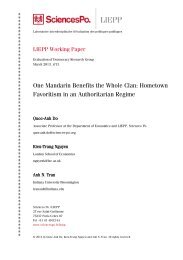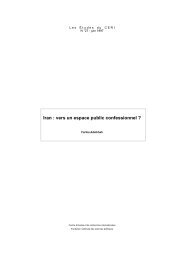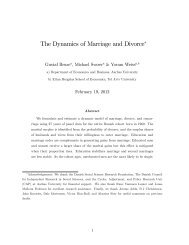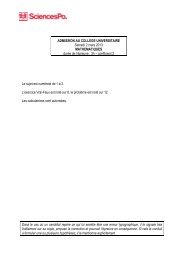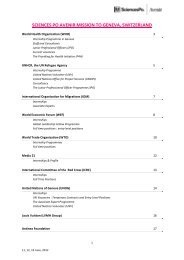The challenge of transnational private governance ... - Sciences Po
The challenge of transnational private governance ... - Sciences Po
The challenge of transnational private governance ... - Sciences Po
You also want an ePaper? Increase the reach of your titles
YUMPU automatically turns print PDFs into web optimized ePapers that Google loves.
Laboratoire interdisciplinaire d'évaluation des politiques publiquesLIEPP Working PaperFebruary 2013, nº8<strong>The</strong> <strong>challenge</strong> <strong>of</strong> <strong>transnational</strong> <strong>private</strong> <strong>governance</strong>:Evaluating authorization, representation, andaccountabilityYannis PapadopoulosUniversity <strong>of</strong> Lausanneioannis.papadopoulos@unil.ch<strong>Sciences</strong> <strong>Po</strong> | LIEPP27 rue Saint-Guillaume75337 Paris Cedex 07Tel : 01 45 49 83 61www.sciencespo.fr/liepp© 2013 by Yannis Papadopoulos. All rights reserved.
<strong>The</strong> <strong>challenge</strong> <strong>of</strong> <strong>transnational</strong> <strong>private</strong> <strong>governance</strong>: Evaluatingauthorization, representation, and accountability 1Yannis PapadopoulosUniversity <strong>of</strong> Lausanneioannis.papadopoulos@unil.ch<strong>The</strong> shift <strong>of</strong> regulatory activities to the international level is clearly visible in theincreasing number <strong>of</strong> intergovernmental organizations and sector-specific “regimes,” orin the progress <strong>of</strong> supranational political integration above all in Europe. But one canalso think <strong>of</strong> a less visible shift that has led to the explosion <strong>of</strong> <strong>transnational</strong> regulationoutside the intergovernmental realm. This shift takes various forms, including public<strong>private</strong>ventures or informal modes <strong>of</strong> cooperation between public actors (Pauwelyn etal. 2012). It is to the study <strong>of</strong> an increasingly important particular aspect <strong>of</strong><strong>transnational</strong> regulation outside the intergovernmental sphere that this programmaticnote is devoted: 2 regulation by non-state actors, such as NGOs and firms, which are two<strong>of</strong> the three poles <strong>of</strong> Abbott and Snidal’s (2009) “<strong>governance</strong> triangle” (the third poleobviously being the state, or more generally public institutions). Such a development isemblematic <strong>of</strong> “a remarkable period <strong>of</strong> institutional innovation in <strong>transnational</strong><strong>governance</strong>” (Hale & Held 2010).Since the 1980s, <strong>transnational</strong> <strong>private</strong> rules have witnessed a global expansion in theirnumber, complexity, and institutional reach (Grabosky 2012). A plethora <strong>of</strong> non-stateand sector-specific <strong>governance</strong> arrangements have been established with the aim <strong>of</strong>developing, setting, and implementing these rules in a variety <strong>of</strong> areas such as finance,corporate <strong>governance</strong>, labor rights, human rights, environmental and intellectualprotection, risk regulation, the Internet, and even security. 3 In the area <strong>of</strong> industrialproduction standard-setting, for instance, “thousands <strong>of</strong> standards were authorized forthousands <strong>of</strong> commodities and productive processes by autonomous and non-1 This paper was also presented to the high-level workshop on “<strong>The</strong> Object and Methodology <strong>of</strong> GlobalGovernance”, European University Institute—Robert Schuman Centre—Global Governance Program,Florence (Italy), 24–25 January 2013.2 I will use “global” and “<strong>transnational</strong>” interchangeably throughout this paper, although I acknowledgethat “<strong>transnational</strong>” may refer to less broad-ranging phenomena than “global.” As a matter <strong>of</strong> fact, many<strong>private</strong> <strong>governance</strong> arrangements are <strong>transnational</strong>, but not truly global.3 See, for instance, the cases <strong>of</strong> <strong>private</strong> <strong>governance</strong> surveyed in Hale and Held (2010a), alongside<strong>transnational</strong> regulatory networks composed <strong>of</strong> public <strong>of</strong>ficials and hybrid forms <strong>of</strong> regulation, such asmulti-stakeholder initiatives.1
into schemes <strong>of</strong> <strong>private</strong> <strong>governance</strong>, and how a larger public is affected by <strong>private</strong>lymade decisions are ones that should be <strong>of</strong> particular interest to political scientists.(Rudder 2008: 909; see also Büthe 2010: 8)Private <strong>governance</strong> is not confined to the <strong>transnational</strong> level, 8 but it is particularlyprominent at this level, and as we shall see below the double reallocation <strong>of</strong> regulatorypower (Cafaggi 2010) from the domestic to the global level and from public to <strong>private</strong>regulators (sometimes coupled with informality) raises important problems. Eventhough <strong>private</strong> <strong>governance</strong> may be socially legitimate, and the exercise <strong>of</strong> regulatorypower by <strong>private</strong> <strong>transnational</strong> actors may in practice be endowed with the “weight” <strong>of</strong>authority (Kratochwil 2006: 306), its normative legitimacy in the light <strong>of</strong> democraticstandards is problematic. Private <strong>governance</strong> affects the behavior <strong>of</strong> target groups andgenerates distributive effects (winners and losers), but at the global level this happensin the absence <strong>of</strong> a public order (Kingsbury et al. 2005) that can possibly tame sucheffects. A specialist in <strong>private</strong> forms <strong>of</strong> <strong>governance</strong> (Cutler 2002: 32) maintains:Only public authorities are entitled or empowered to prescribe behavior for othersbecause only public authorities are accountable through political institutions.Private entities, such as corporations or business associations, are not entitled to actauthoritatively for the public, because they are not authorized by society and arethus not subject to mechanisms <strong>of</strong> political accountability. Indeed, theiraccountability (legally and financially) is to their <strong>private</strong> members. Thus, underdemocratic theory, only elected representatives and their delegates may functionauthoritatively in prescribing and proscribing behavior.Referring to social and environmental accreditation bodies, such as the Fair TradeLabeling Organization or the Forest Stewardship Council; or to financial regulators suchas the International Accounting Standards Committee Foundation and the International8 A number <strong>of</strong> countries are familiar with “PIGs” (<strong>private</strong> interest governments), mostly composed <strong>of</strong>interest-group associations (Streeck & Schmitter 1985). PIGs do not confine themselves to the narrowself-regulation <strong>of</strong> a specific sector, such as vocational training, but they may produce decisions that affectbroad and diffuse interests, such as those <strong>of</strong> consumers. Such decisions may even acquire the force <strong>of</strong> lawthrough <strong>of</strong>ficial “imprimatur.” This is demonstrated by negotiated “corporatist” agreements betweenbusiness and labor unions regarding economic and social policy matters, and by standards set bypr<strong>of</strong>essional associations; in those cases, the authority <strong>of</strong> PIGs is not truly distinguishable from that <strong>of</strong> thegovernment (Rudder 2008). At the state level <strong>private</strong> <strong>governance</strong> modes are constrained by constitutionallimitations (Cafaggi 2010: 15).5
epresentatives to behave in a responsive way. <strong>The</strong> normative attractiveness <strong>of</strong> such acircular model relies thus on the existence <strong>of</strong> a direct line upward from “we the people”to government, and downward from government to society (Hupe & Edwards 2011: 6).Not only representatives are accountable to voters, but also the whole delegation chainis supposed to be supplemented by a parallel accountability chain operating in thereverse direction. <strong>The</strong> parliament delegates some <strong>of</strong> its powers to the executive, whichdelegates them to the bureaucracy; in return, members <strong>of</strong> the bureaucracy areaccountable to their superiors, and (in parliamentary systems) the latter areaccountable to the majority that supports them.<strong>The</strong> following description <strong>of</strong> (among others) <strong>private</strong> rulemaking bodies shows that theexercise <strong>of</strong> <strong>transnational</strong> <strong>private</strong> <strong>governance</strong> substantially deviates from the classicmodel <strong>of</strong> authorization, representation, and accountability:<strong>The</strong>re are no governmental actors represented in the FTLO, the FSC or the IASC orIASB, but the Basel Committee is comprised <strong>of</strong> banking supervisors from the G10countries. However, they share the characteristic that their activities are not basedon or mandated by national, supranational, or international law. Moreover, there areno clear existing structures such as courts, legislative committees, national auditors,ombudsmen, and so on, to which recourse can be made to render them accountable;they have no clear jurisdictional boundaries; and there is no easily identifiable set <strong>of</strong>potential democratic participants in their processes. (Black 2008: 138)- <strong>The</strong> fact that decisions are taken at a global level extends the chain <strong>of</strong>delegation. 15- <strong>The</strong> fact that decision-making actors are <strong>private</strong> may undermine beliefs in theexistence <strong>of</strong> a congruence relationship between policymakers and policy-“takers.”In addition, the accountability <strong>of</strong> decision-makers is an open question.- <strong>The</strong> fact that in some cases decision-making bodies are set up informally<strong>challenge</strong>s the principle <strong>of</strong> authorization (informal networks operate in a sort <strong>of</strong>15 This is also true for <strong>of</strong>ficial decision-making in intergovernmental organizations. “Intergovernmentalists”argue that as long as governments are democratically elected they enjoy sufficient legitimacy, whereasmore critical scholars claim that the lack <strong>of</strong> visibility makes accountability fictitious (e.g., the problem <strong>of</strong>“many hands” in cooperative decision-making facilitates blame avoidance and credit claiming).9
“gray zone” and are not necessarily composed <strong>of</strong> formally authorizedrepresentatives). 16I need to add here that the attributes <strong>of</strong> <strong>private</strong> global <strong>governance</strong> that make it deficientwith respect to the requirements <strong>of</strong> democratic authorization, representation, oraccountability are structural. I do not see such gaps as the outcome <strong>of</strong> deliberate designon behalf <strong>of</strong> malevolent rulers. True, it is argued sometimes that the shift <strong>of</strong> regulationinto <strong>private</strong> hands (or to technocratic bodies such as independent agencies) is inspiredby politicians’ attempts to avoid blame in case <strong>of</strong> regulatory failures. However, this is noteasy to prove. In my view, this shift mainly results from the primacy among designers <strong>of</strong>(and participants in) <strong>private</strong> regulatory bodies, <strong>of</strong> too narrowly conceived concerns forregulatory effectiveness and efficiency. Vibert (2011: 13) refers to improvisationcombined with a neglect <strong>of</strong> normative standards. In addition, the media and the publicare not aware <strong>of</strong> the scope and the complexities <strong>of</strong> global <strong>private</strong> <strong>governance</strong>: “It is aworld that is comprehensible only to experts and specialists” (Vibert 2011: 36). Asubstantial amount <strong>of</strong> power is now in the hands <strong>of</strong> various de facto rulers whosedemocratic authorization and accountability are deficient. However, the democraticdeficit <strong>of</strong> global <strong>private</strong> <strong>governance</strong> develops by stealth, is hardly visible, and thus notsubject to public debate.III.Research questions<strong>The</strong> democratic deficit <strong>of</strong> <strong>private</strong> <strong>governance</strong> is a variable and depends on the specificconfiguration <strong>of</strong> each <strong>governance</strong> arrangement. 17 First, this deficit is more acute if<strong>governance</strong> outputs closely approximate hard law, and if broad communities areintensely affected in their vital interests and life chances (Macdonald 2012) by <strong>private</strong>16 Although the growth <strong>of</strong> <strong>private</strong> and informal modes <strong>of</strong> <strong>governance</strong> seems to be a major global trend,these things should not be conflated (<strong>private</strong> <strong>governance</strong> arrangements may be codified, whereasinformal cooperation can take place among public actors). While the problem for Pauwelyn et al. (2010)or Vibert (2011) is the informality <strong>of</strong> network-like processes <strong>of</strong> frequently “s<strong>of</strong>t” regulation, the problemhere is primarily its non-public character.17 Zweifel (2006) compares the variable democratic deficit <strong>of</strong> international institutions. Writing on creditrating agencies, Kerwer (2005: 472) pleads for “a comparative research project [that] could identify theaccountability <strong>challenge</strong>s that arise in these cases and point out the differences between them.”10
How influential are the diverse <strong>private</strong> <strong>governance</strong> arrangements? “Which normsare ‘law’ and which are not” (Black 2008: 140): How “s<strong>of</strong>t” or “hard” are thenorms they produce? 21 What is the degree <strong>of</strong> their “crystallization” (Casey & Scott2011), and through what kind <strong>of</strong> formal devices are they hardened? Are thesenorms formally or de facto binding, and if de facto, then whose freedom do theyrestrict, to what extent, and through what kind <strong>of</strong> social mechanisms? Are we justin the presence <strong>of</strong> “self”-regulation by a community, or <strong>of</strong> the regulation <strong>of</strong> others,too? Büthe (2010: 8) distinguishes three major subsets <strong>of</strong> stakeholders for<strong>private</strong> regulation: the actors who call for <strong>private</strong> regulation, the <strong>private</strong> actorswho supply such rules for the global economy, and the “targets” <strong>of</strong> the rules. Selfregulationimplies an overlap between these groups; the less this overlap exists,the more a democratic deficit can be posited.In addition, does regulation produce spillover effects on others outside this triad?How extended is the circle <strong>of</strong> affected third parties, how intensely are theyaffected, and who can be considered as beneficiaries and who as losers? <strong>The</strong>seare, <strong>of</strong> course, questions that cannot be easily answered. It is argued that infragmented power systems such as those <strong>of</strong> <strong>transnational</strong> <strong>private</strong> <strong>governance</strong>“myriad non-state actors can also wield ‘public’ forms <strong>of</strong> power when theysystematically affect people’s lives in autonomy-threatening ways” (Macdonald2012a: 50). However, substantiating claims about such causal relations is difficultand requires very cautious process tracing. <strong>The</strong>refore, as a preliminary question,is there a consensus on who is affected (and how much) and who is not? 2221 “Legalization” entails at least three independent dimensions: degree <strong>of</strong> obligation, extent <strong>of</strong> precision,and provisions for delegated implementation by third parties (Abbot et al. 2000). In the field <strong>of</strong>certification, Bernstein and Cashore (2007: 350) distinguish between, on the one hand, self-regulation andcorporate social responsibility standards that are voluntary, and on the other hand “non-state marketdriven” certification systems that develop mandatory standards for those who sign into the system,contain external (independent) auditing mechanisms,, and provide for sanctions in case <strong>of</strong> failure tocomply. On multiple ways to harden s<strong>of</strong>t law, see Picciotto (2011: 200–206). However, one should notconsider that enforcement problems are necessarily less acute in hard than in s<strong>of</strong>t law. See Cafaggi (2012)on the enforcement <strong>of</strong> <strong>private</strong> rules and compliance with them.22 Notwithstanding the participatory rhetoric <strong>of</strong> rulemaking bodies, there is <strong>of</strong>ten controversy on who is a“stakeholder,” and the universe <strong>of</strong> affected people is not necessarily confined to the list <strong>of</strong> those <strong>of</strong>ficiallyaccredited as “stakeholders” by institutional gatekeepers.12
What is the institutional design (mainly the structure and degree <strong>of</strong>formalization) <strong>of</strong> the <strong>governance</strong> arrangements considered? How areparticipants selected, and whom are they supposed to represent? Who amongthem are the most influential, considering the usually high requirements in terms<strong>of</strong> expertise that may induce gaps between formal participation rights andeffective impact on rulemaking (Quack 2010)? Once we have identified them, towhat extent do those affected have a voice in the activity <strong>of</strong> norms production?What kinds <strong>of</strong> channels for communication and influence are they able to utilize?To what extent, and through which mechanisms, is the “congruence” principlebetween policymakers and “policy-takers” safeguarded? Or, to put it differently,how high is the distance between demanders for rules, suppliers (rulemakers),targets (those subject to rules), and other affected groups?Consent may express itself through participation in rulemaking, but also throughthe authorization for a <strong>private</strong> <strong>governance</strong> site to rule, or through approval if onehas a veto capacity over the outputs <strong>of</strong> rulemaking bodies (accountability). <strong>The</strong>larger the proportion <strong>of</strong> stakeholders who are absent from these phases <strong>of</strong> therulemaking process, the greater the democratic deficit. Even if the affected haveno voice in rulemaking, is at least some form <strong>of</strong> ex ante or ex post consentrequired from them? If crucial stakeholders have no sufficient voice in theprocess, 23 are at least <strong>governance</strong> processes and outputs visible to the (which?)public, and thus subject to dissonance, contestation, and dissent (Vibert 2011)?Public debate may reveal not only the existence <strong>of</strong> interests that are ignored byrulemaking bodies, but also <strong>of</strong> different frames and modes <strong>of</strong> reasoning: Howbroad, then, is the circle <strong>of</strong> public debate on the outputs <strong>of</strong> <strong>private</strong> <strong>governance</strong>,and what kind <strong>of</strong> feedback effects does this debate produce, if any?A closer scrutiny <strong>of</strong> representation processes is necessary: Do representativeorgans or elected <strong>of</strong>ficials play a role? If yes, which are the representedconstituencies, and how do representatives come to play their role? If not, havethose who are formally authorized to issue collectively binding decisions23 See, for instance, Büthe & Mattli (2011: 222-225) on the difficulties consumer interests face in beingvoiced in <strong>private</strong> <strong>transnational</strong> standard-setting bodies.13
formulation moment and a less open implementation phase (Mattli & Woods2009: 19). In a multi-level system, do implementing bodies operate under theshadow <strong>of</strong> control, how effective is this shadow in making them internalize thepreferences <strong>of</strong> the accountability “forums,” and (again) what are the democraticcredentials <strong>of</strong> these forums?Finally—and this is typically the kind <strong>of</strong> value-added that can be provided bypolitical science research—in all these accountability episodes, does “real-world”accountability operate as prescribed on paper by formal accountability “regimes”(regarding justification, debate, and sanctions), if any? And, if not, why (due toinformational asymmetries, collective action problems, etc.)? Is, for example, theaccountability chain so excessively long that problems <strong>of</strong> “hidden action” and“hidden information” inhibit effective monitoring, rendering the exercise <strong>of</strong>accountability fictitious even in the presence <strong>of</strong> a favorable institutionalstructure? We should keep in mind here that the problem with accountability isthe same as with regulation (Mattli & Woods 2009): supply does not createdemand.16
ReferencesAbbott, Kenneth W. and Duncan Snidal (2009). <strong>The</strong> <strong>governance</strong> triangle: regulatorystandards institutions and the shadow <strong>of</strong> the state. In Mattli, Walter and NgaireWoods (eds.), <strong>The</strong> <strong>Po</strong>litics <strong>of</strong> Global Regulation. Princeton University Press (44-88).Abbott, Kenneth W. et al. (2000). <strong>The</strong> concept <strong>of</strong> legalization. International Organization54(3): 401-419.Avant, Deborah D., Martha Finnemore and Susan K. Sell (2010). Conclusion: authority,legitimacy and accountability in global politics. In Avant, Deborah D., MarthaFinnemore and Susan K. Sell (eds.), Who Governs the Globe? Cambridge UniversityPress (356-370).Avant, Deborah D. , Martha Finnemore, and Susan K. Sell (2010a). Who governs theglobe? In Avant, Deborah D., Martha Finnemore and Susan K. Sell (eds.), WhoGoverns the Globe? Cambridge University Press (1-32).Bartley, T. (2007). Institutional Emergence in an Era <strong>of</strong> Globalization: <strong>The</strong> Rise <strong>of</strong>Transnational Private Regulation <strong>of</strong> Labor and Environmental Conditions.American Journal <strong>of</strong> Sociology 113(2): 297-351.Bernstein, Steven and Benjamin Cashore (2007). Can non-state global <strong>governance</strong> belegitimate? An analytical framework. Regulation & Governance 1(4): 1-25.Bexell, Magdalena and Ulrika Mörth (2010), (eds.). Democracy and Public-PrivatePartnerships in Golbal Governance. Basingstoke: Palgrave.Black, Julia (2008). Constructing and contesting legitimacy and accountability inpolycentric regulatory regimes. Regulation & Governance 2(2): 137-64.Black, Julia (2009). Legitimacy and the Competition for Regulatory Share. LSE Law,Society and Economy Working Papers 14/2009.Börzel, Tanja A. (2008). Private Actors on the Rise? <strong>The</strong> Role <strong>of</strong> Non-State Actors inCompliance with International Institutions. Max-Planck-Projektgruppe Recht derGemeinschaftsgüter. Online: http://www.coll.mpg.de/?q=node/1061 (accessed:29.12.2012)Borowiak, Craig T. (2011). Accountability and Democracy: <strong>The</strong> Pitfalls and Promise <strong>of</strong><strong>Po</strong>pular Control. Oxford: Oxford University Press.Brassett, James et al. (2012). Private experiments in global <strong>governance</strong>: primarycommodity roundtables and the politics <strong>of</strong> deliberation. International <strong>The</strong>ory4(3): 367-399.Büthe, Tim (2010). Private Regulation in the Global Economy: A (P)Review. Business and<strong>Po</strong>litics 12(3): 2.Büthe, Tim (2010a). <strong>The</strong> <strong>Po</strong>wer <strong>of</strong> Norms; the Norms <strong>of</strong> <strong>Po</strong>wer: Who GovernsInternational Electrical and Electronic Technology? In Avant, Deborah D., MarthaFinnemore and Susan K. Sell (eds.), Who Governs the Globe? Cambridge UniversityPress (292-332).Büthe, Tim (2010b). <strong>The</strong> Origins and Institutional Development <strong>of</strong> the InternationalElectrotechnical Commission (IEC). Business and <strong>Po</strong>litics Vol. 12 No. 3.Büthe, Tim and Walter Mattli (2010). Standards for Global Markets: Domestic andInternational Institutions. In Enderlein, Henrik et al (eds.), Handbook on MultilevelGovernance. Cheltenham: Edward Elgar (455-476).Büthe, Tim and Walter Mattli (2011). <strong>The</strong> New Global Rulers: <strong>The</strong> Privatization <strong>of</strong>Regulation in the World Economy. Princeton, NJ: Princeton University Press.17
Cafaggi, Fabrizio (2010). New Foundations <strong>of</strong> Transnational Private Regulation. EUIWorking Paper RSCAS 2010/53.Cafaggi, Fabrizio (ed.) (2012). Enforcement <strong>of</strong> Private Regulation. Ensuring Compliance ina Global World. Cheltenham: Edward Elgar.Casey, Daniel and Colin Scott (2011). <strong>The</strong> Crystallization <strong>of</strong> Regulatory Norms. Journal <strong>of</strong>Law and Society 38(1): 76-95.Cashore, Benjamin W. (2002). Legitimacy and the Privatization <strong>of</strong> EnvironmentalGovernance: How-Non State Market-Driven (NSMD) Governance Systems GainRule Making Authority. Governance: An International Journal <strong>of</strong> <strong>Po</strong>licy andAdministration Vol. 15, No. 4 (October) 503-529.Cashore, Benjamin W., Graeme Auld and Deanna Newsom (2004). Governing throughmarkets: forest certification and the emergence <strong>of</strong> non-state authority. Yale Univ Pr.Chan, Sander and Philipp Pattberg (2008). Private Rule-Making and the <strong>Po</strong>litics <strong>of</strong>Accountability: Analyzing Global Forest Governance. Global Environmental<strong>Po</strong>litics 8(3): 103-121.Chango, Mawaki (2011). Accountability in <strong>private</strong> global <strong>governance</strong>: ICANN and civilsociety. In Jan A.S cholte (ed.), Building Global Democracy? Civil Society andAccountable Global Governance. Cambridge: Cambridge UP (267-288).Corthaut, Tim et al. (2012). Operationalizing Accountability in Respect <strong>of</strong> InformalInternational Lawmaking Mechanisms. In Puwelyn, Joost et al. (eds.), InformalInternational Lawmaking. Oxford: Oxford University Press (310-336).Curtin, Deirdre and Linda Senden (2011). Public Accountability <strong>of</strong> Transnational PrivateRegulation: Chimera or Reality? Journal <strong>of</strong> Law and Society 38(1): 163-88.Cutler, A. Claire (2002). Private international regimes and interfirm cooperation. In Hall,Rodney B. and and Thomas J. Biersteker (eds.), <strong>The</strong> Emergence <strong>of</strong> PrivateAuthority in Global Governance. Cambridge: Cambridge University Press (23-40).Cutler, A. Claire et al. (1999), (eds.). Private Authority and International Affairs. NewYork: SUNY Press.Dingwerth, Klaus (2007). <strong>The</strong> New Transnationalism: Transnational Governance andDemocratic Legitimacy. Basingstoke: Palgrave.Drezner, Daniel (2007). All <strong>Po</strong>litics is Global: Explaining International Regulatory Regimes.Princeton NJ: Princeton UP.Easton, David (1965). A Systems Analysis <strong>of</strong> <strong>Po</strong>litical Life. New York: Wiley.Erman, Eva and Anders Uhlin (2010), (eds.). Legitimacy Beyond the State? Re-Examiningthe Democratic Credentials <strong>of</strong> Transnational Actors. Basingstoke: Palgrave.Fuchs, Doris et al. (2010). Democratic Legitimacy <strong>of</strong> Transnational Corporations inGlobal Governance. In Erman, Eva and Anders Uhlin (eds.), Legitimacy Beyond theState? Re-Examining the Democratic Credentials <strong>of</strong> Transnational Actors.Basingstoke: Palgrave (41-63).Grabosky, Peter (2012). Beyond Responsive Regulation: <strong>The</strong> expanding role <strong>of</strong> non-stateactors in the regulatory process. Regulation & Governance, Early View DOI:10.1111/j.1748-5991.2012.01147.xGrant, Ruth W. and Robert O. Keohane (2005). Accountability and Abuses <strong>of</strong> <strong>Po</strong>wer inWorld <strong>Po</strong>litics. American <strong>Po</strong>litical Science Review 99(1): 29-44.Hale, Thomas and David Held (2010). Editors’ Introduction: Mapping Changes inTransnational Governance. In Hale, Thomas and David Held (eds.), Handbook <strong>of</strong>Transnational Governance. Institutions & Innovations. Cambridge: <strong>Po</strong>lity Press (1-36).18
Hale, Thomas and David Held (2010a), (eds.). Handbook <strong>of</strong> Transnational Governance.Institutions & Innovations. Cambridge: <strong>Po</strong>lity Press.Hall, Rodney B. and Thomas J. Biersteker (2002). <strong>The</strong> emergence <strong>of</strong> <strong>private</strong> authority inglobal <strong>governance</strong>. Cambridge Univ Pr.Hirschland, M. J. (2006). Corporate social responsibility and the shaping <strong>of</strong> global publicpolicy. Palgrave Macmillan.Hupe, Peter and Arthur Edwards (2011). <strong>The</strong> accountability <strong>of</strong> power: Democracy and<strong>governance</strong> in modern times. European <strong>Po</strong>litical Science Review, First View: 1-18.Keohane, Robert E. (2011). Global <strong>governance</strong> and legitimacy. Review <strong>of</strong> International<strong>Po</strong>litical Economy 18(1): 99–109.Kerwer, Dieter (2005). Rules that many use: standards and global regulation.Governance: An International Journal <strong>of</strong> <strong>Po</strong>licy, Administration and Institutions18(4): 611-32.Kingsbury, Benedict (2005). <strong>The</strong> Emergence <strong>of</strong> Global Administrative Law. Law andContemporary Problems 68(3-4): 15-61.Koenig-Archibugi, Mathias and Kate Macdonald (2012). Accountability-by-Proxy inTransnational Non-State Governance. Governance: An International Journal <strong>of</strong><strong>Po</strong>licy and Administration, Early View DOI 10.1111/j.1468-0491.2012.01609.xKoppell, Jonathan G. S. (2005). Pathologies <strong>of</strong> Accountability: ICANN and the Challenge<strong>of</strong> “Multiple Accountabilities Disorder. Public Administration Review 65.1(2005):94-108.Koppell, Jonathan G.S. (2010). World Rule. Accountability, Legitimacy, and the Design <strong>of</strong>Global Governance. Chicago: <strong>The</strong> University <strong>of</strong> Chicago Press.Kratochwil, Friedrich (2006). On Legitimacy. International Relations 20: 302-308.Lipschutz, Ronnie and James K. Rowe (2005). Globalization, Governmentality and Global<strong>Po</strong>litics. Regulation for the Rest <strong>of</strong> Us? London & New York: Routledge.Macdonald, Kate (2012). Global democracy for a partially joined-up world: Toward amulti-level system <strong>of</strong> public power and democratic <strong>governance</strong>? In Archibugi,Daniele et al. (eds.), Global Democracy. Normative and Empirical Perspectives.Cambridge: Cambridge University Press (183-209).Macdonald, Terry (2012a). Citizens or stakeholders? Exclusion, equality and legitimacyin global stakeholder democracy. In Archibugi, Daniele et al. (eds.), GlobalDemocracy. Normative and Empirical Perspectives. Cambridge: CambridgeUniversity Press (47-68).Manin, Bernard (1997). Principles <strong>of</strong> Representative Government. Cambridge: CambridgeUniversity Press.Mattli, Walter and Tim Büthe (2003). Setting International Standards: TechnologicalRationality or Primacy <strong>of</strong> <strong>Po</strong>wer? World <strong>Po</strong>litics 56(1): 1-42.Mattli, Walter and Tim Büthe (2005). Global <strong>private</strong> <strong>governance</strong>: lessons from a nationalmodel <strong>of</strong> setting standards in accounting. Law and contemporary problems 68(3):225-262.Mattli, Walter and Ngaire Woods (2009). In Whose Benefit? Explaining RegulatoryChange in Global <strong>Po</strong>litics. In Mattli, Walter and Ngaire Woods (eds.), <strong>The</strong> <strong>Po</strong>litics<strong>of</strong> Global Regulation. Princeton University Press (1-43).Moon, Jeremy, Nahee Kang and Jean-Pascal Gond (2010). Corporate social responsibilityand government. In Coen, David, Wyn Grant and Graham Wilson (eds.), <strong>The</strong>Oxford Handbook <strong>of</strong> Business and Government. Oxford: OUP (512-543).Murphy, Craig N. and JoAnne Yates (2009). <strong>The</strong> International Organization forStandardization (ISO): Global Governance through Voluntary Consensus. Routledge.19
Pauwelyn, Joost et al. (2012), (eds.). Informal International Lawmaking. Oxford. OxfordUniversity Press.Perry, James (2009). Goodwill Hunting: Accounting and the Global Regulation <strong>of</strong> EconomicIdeas. PhD Dissertation: Free University Amsterdam.Perry, James and Andreas Nölke (2006). <strong>The</strong> political economy <strong>of</strong> internationalaccounting standards. Review <strong>of</strong> International <strong>Po</strong>litical Economy, 13(4): 559-86.Peters, Ann et al. (2009), (eds.). Non-state Actors as Standard-Setters. Cambridge:Cambridge UP.Picciotto, Sol (2011). Regulating Global Corporate Capitalism. Cambridge: Cambridge UP.Prakash, Aseem and <strong>Po</strong>toski, Matthew (2006). <strong>The</strong> Voluntary Environmentalists: GreenClubs, ISO 14001, and Voluntary Regulations. Cambridge: Cambridge UP.Prakash, Aseem and Matthew <strong>Po</strong>toski (2010). <strong>The</strong> International Organization forStandardization as a global governor: a club theory perspective. In Avant,Deborah D., Martha Finnemore and Susan K. Sell (eds.), Who Governs the Globe?Cambridge University Press (72-101).Quack, Sigrid (2010). Law, expertise and legitimacy in <strong>transnational</strong> <strong>governance</strong>: anintroduction. Socio-Economic Review 8(1): 3-16.Ronit, Karsten and Volker Schneider (1999). Global <strong>governance</strong> through <strong>private</strong>organizations. Governance 12(3): 243-66.Rosenau, James N. (2002). Governance in a New Global Order. In Held, David andAnthony McGrew (eds.), Governing Globalization. Cambridge: <strong>Po</strong>lity Press (70-86).Rudder, Catherine E. (2008). Private Governance as Public <strong>Po</strong>licy: A Paradigmatic Shift.<strong>The</strong> Journal <strong>of</strong> <strong>Po</strong>litics 70 4): 899-913.Schepel, Harm (2005). <strong>The</strong> Constitution <strong>of</strong> Private Governance: Product Standards in theRegulation <strong>of</strong> Integrating Markets. <strong>Po</strong>rtland: Hart Publishers.Scherer, Andreas G., Guido Palazzo, and Dorothée Baumann. (2007). Global Rules andPrivate Actors—Towards a New Role <strong>of</strong> the Transnational Corporation in GlobalGovernance. Internationales Management im Umbruch 3-39.Schneider, Steffen et al. (2010). Democracy's Deep Roots: Why the Nation State RemainsLegitimate. Basingstoke: Palgrave Macmillan.Scholte, Jan A. (2011), (ed.). Building Global Democracy? Civil Society and AccountableGlobal Governance. Cambridge: Cambridge UP.Scott, Colin et al. (2011), (eds.). <strong>The</strong> Challenge <strong>of</strong> Transnational Private Regulation:Conceptual and Constitutional Debates. Blackwell.Shapiro, Martin (2002). <strong>The</strong> Giving Reasons Requirement. In Shapiro, Martin and AlecStone Sweet (eds.), On Law, <strong>Po</strong>litics and Judicialization. Oxford: Oxford UniversityPress (228-258).Steffek, Jens and Kristina Hahn (2010), (eds.). Evaluating Transnational NGOs:Legitimacy, Accountability, Representation. Basingstoke: Palgrave.Streeck, Wolfgang and Phillippe C. Schmitter (1985), (eds.). Private Interest Government:Beyond Market and State. London: Sage.Take, Ingo (2012). Regulating the Internet infrastructure: A comparative appraisal <strong>of</strong> thelegitimacy <strong>of</strong> ICANN, ITU and the WSIS. Regulation & Governance 6(4): 499-523.Take, Ingo (2012a). Legitimacy in Global Governance: International, Transnational andPrivate Institutions Compared. Swiss <strong>Po</strong>litical Science Review 18(2): 220-248.Tallberg, Jonas and Anders Uhling (2012). Civil society and global democracy. Anassessment. In Archibugi, Daniele et al. (eds.), Global Democracy. Normative andEmpirical Perspectives. Cambridge: Cambridge University Press (210-232).20
Ullrich, Heidi (2011). Civil society and the World Fair Trade Organization: developingresponsive accountability. In Scholte, Jan A. (ed.), Building Global Democracy? CivilSociety and Accountable Global Governance. Cambridge: Cambridge UP (289-305).Vibert, Frank (2011). Democracy and Dissent. <strong>The</strong> Challenge <strong>of</strong> International Rule Making.Cheltenham: Edward Elgar.Vogel, David (2006). <strong>The</strong> Market for Virtue: <strong>The</strong> <strong>Po</strong>tential And Limits <strong>of</strong> Corporate SocialResponsibility. Brookings Institution.Vogel, David (2008). Private Global Business Regulation. Annual Review <strong>of</strong> <strong>Po</strong>liticalScience 11: 261-82.Vogel, David (2009). <strong>The</strong> Private Regulation <strong>of</strong> Global Corporate Conduct. In Mattli,Walter and Ngaire Woods (eds.), <strong>The</strong> <strong>Po</strong>litics <strong>of</strong> Global Regulation. PrincetonUniversity Press (151-188).Weinberg, Jonathan (2012). Non-state actors and global informal <strong>governance</strong>: the case<strong>of</strong> ICANN”, in Christiansen, Thomas and Christine Neuhold (eds.), InternationalHandbook on Informal Governance. Cheltenham: Edward Elgar (292-313).Zweifel, Thomas D. (2006). International Organizations and Democracy. Boulder (Col.):Lynne Riener Publishers.21



